Anatomy of an Era: R. Scott Clark, Theologian
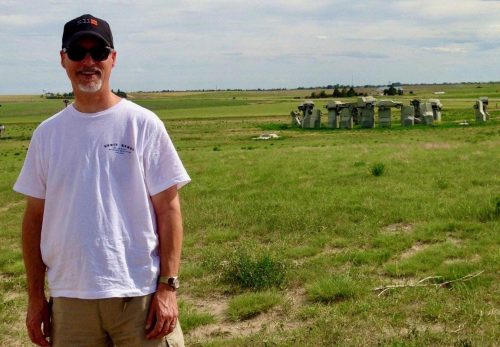
Excerpted from Chapter 76, No Place Like Nebraska: Anatomy of an Era, Vol. 2 by Paul Koch
The valiant men are in scarlet.
..They jostle one another in the broad roads;
They seem like torches,
They run like lightning.
..And the defense is prepared.
-Nahum 2:3-5, The Holy Bible, The Reformation Study Bible, New King James Version, Thomas Nelson Publishers, 1995
Faith in the game. Not only was it the title of Coach Osborne’s personal and revelatory book of his coaching life and that career’s pensive aftermath, but the term also hints at the ‘religion,’ per se, of Nebraska Football. Earlier we’ve read of the program’s far-reaching fan base and its willingness to support the student-athletes’ interests with its abounding praise and exaltation, its pervasive desire to extend a collective public endearment.
But perhaps ‘endearment’ is too weak a word, because to some Nebraska Football plays an all-encompassing role in defining who they are as a human being. I find this fact a bit saddening, but there it is nonetheless. Like most any object of affection, the passionate love for this game has its degrees of adoration, its colors & hues of intensity, with its elevated personalities and miraculous historical feats for our fond recollection. But that’s not to say it’s always been a healthy love, though, as more than one man can attest, including yours truly.
Many former players have mentioned the support of the fan base and the unique arms-length relationships cultivated during their time as student/athletes as playing a part in their 60 & 3 accomplishments. Husker Nation’s affinity for football often borders on the spiritual and holds many parallels to that of organized religion, so I took some liberty to delve further into the mind, the heart and soul of the typical Husker Fan. And boy oh boy, did I find a doozy in R. Scott Clark, an expatriate Nebraskan now serving as a Professor of Church History and Historical Theology at Westminster Seminary in Escondido, California. With a bachelor’s of Arts from the University of Nebraska, followed by a Master of Divinity from Westminster and a Doctor of Philosophy from Oxford University in Cambridge, England, he’s had half a lifetime to experience and explore the many facets of the Big Red Sickness. His professional website bio reads, “What I Want to Instill in My Students: “I want to connect my students with their past and let the past influence them, teach them, and guide them inasmuch as it can and should, and help them to think well biblically and Christianly about the faith, about the Scriptures, about themselves, about this world, and about their place in it.”
Listen in on Scott’s confessions, er… thoughts on the madness that is this incurable, grandiose, shared malady of Nebraska football and his -as well as our- place in it.
Notable quote #1:
“The passion -you’ve been there, you know what it was like- the pain. I realized in that game Nebraska Football was too important to me. I always denied that it was an idol, but at that moment I realized I had invested way too much of myself in Nebraska football. I mean, it was crazy what a bunch of teenagers and twenty year-olds did on a football field… how could that affect me so much?”
R. Scott Clark
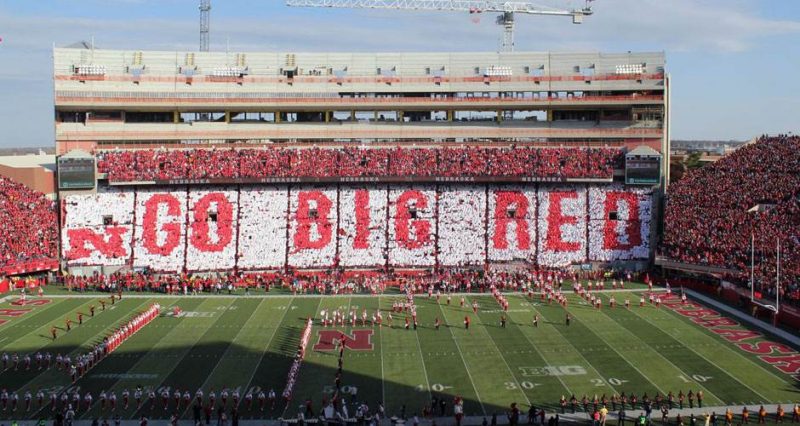
Question: Hey Scott, I appreciate your making yourself available since you’re a Husker Theologian-slash-Christian Theologian. (chuckling)
Scott Clark: (laughs) Sure. That’s fine. However I can be helpful, that’s fine.
Q: So you grew up in Lincoln, right?
SC: Yeah, Omaha and Lincoln. I was 10 years in Omaha, in a couple of different neighborhoods, Dundee and Benson. And about ten years in Lincoln, so I guess we call Lincoln home. That’s where my family is and that’s where I went to high school. And I probably know Lincoln a little better than I know Omaha, but I still have friends in Omaha and when I go back in the summers I preach there.
There’s a PCA(Presbyterian Church in America) in the middle of town on 30-something & Cummings, not far from St. Cecilia’s. It’s Harvest Community PCA. It’s a good place. The pastor is a friend of mine and in fact we were in seminary together, and I often preach there in the summers when I go back. I was raised most of my youth in Nebraska and grew up like, I guess, like almost everyone else and had a pretty strong love of the Huskers.
Q: So you were baptized into the Big Red Congregation at an early age, eh?
SC: Like I’ve said when we’ve talked before, we’d watch the games when they were on, and back then they weren’t on TV very often. We’d always listen to the games. I think my strongest memory is of listening to the games on the radio. Back then there wasn’t just one broadcast, there were four or five different broadcasts. And of course, Lyell Bremser was on KFAB and they had the best signal, a 50,000 watt signal and it covered everything.
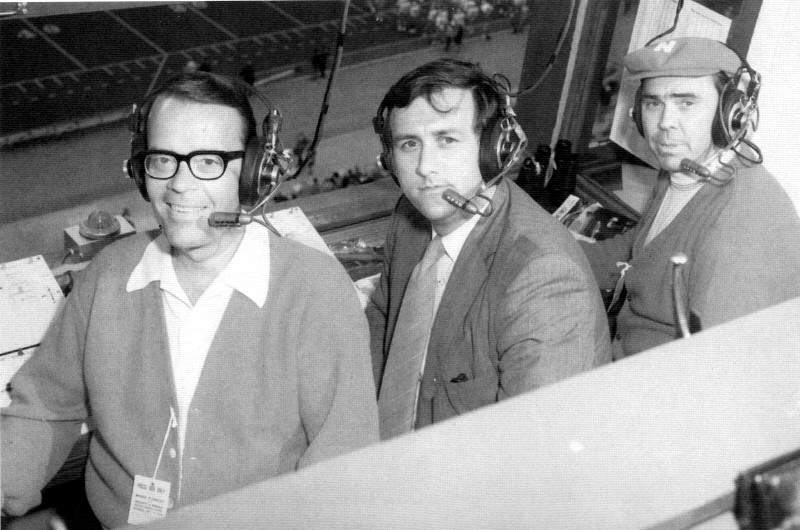
And really, on a Saturday, you really didn’t even need a radio because everybody had the radio on and everywhere you went the game was on, and so you really didn’t even miss anything. I remember we were delivering magazines or newspapers one time on a Saturday afternoon and I remember being a little disgusted because it was game time, but as we walked down the sidewalk everybody had the game on. I was hearing the game as I delivered! (laughs) So we always listened to the game, and at halftime we’d go out and pretend to be whoever the big star of the day was, Jerry Tagge or Joe Orduna. I remember there was this up-and-coming kid, Johnny Rodgers, who was supposed to be something. I think, really, my earliest, clearest memory was in 1969 and Joe Orduna was the big thing. He was the running back, and I remember the ‘70-’71 team with Tagge and Van Brownson at quarterback. And people forget the defense, you know? Larry Jacobsen and Rich Glover and big John Dutton. Those guys were monsters! So anyway, I had a pretty unwavering devotion to the Huskers right up until I went to college.
And it’s funny, on the campus it’s kind of hip among the university students (especially the ones who consider themselves a little more academic-than-thou), to kind of look down on football. And plus, I have to confess, the student seats were so terrible -I really hated the games because I couldn’t see anything. There was all this craziness, these fraternity guys would be passing the sorority girls overhead and everything, it was so drunk and disorderly. In the beginning of the season it’s hot and at the end of the season it’s cold, so I really didn’t go very much.
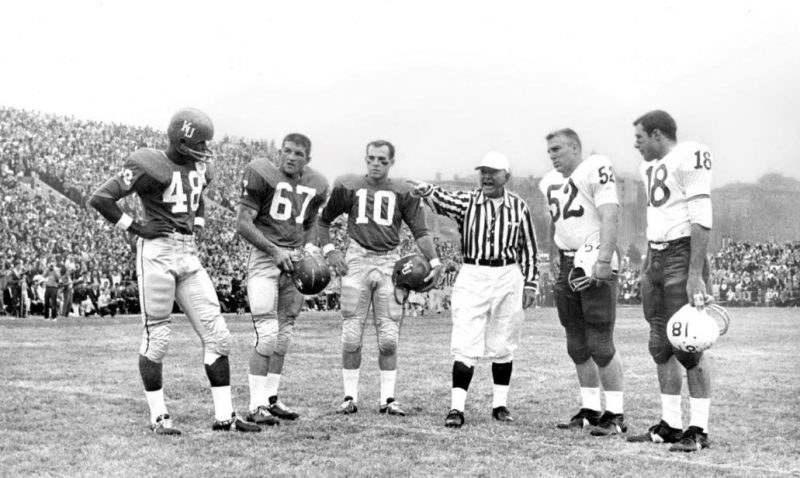
In fact, at one point I drove a cab at the University. I worked my way through college doing a lot of things: I used to deliver football tickets and film. I don’t know if they were bribes, (laughs) but I used to deliver football tickets to some key state senators just before some key votes. (laughing ) I remember delivering some film highlights once, and I dropped a big old can of film on my big toe -I think I busted my toe- and I was so mad at the football team. (laughs) It wasn’t the football team’s fault, but I remember thinking if it wasn’t for delivering the football team’s highlights I wouldn’t have busted my toe. But you just couldn’t really fly your colors that openly at that time, you know? Because some of the students looked down on it, which was strange. I have the sense that that might have changed in the 90’s, but coming out of the end of the 70’s it was still kind of the late stages of the hippie movement and it was a different kind of ethos back then than it was in the 90’s. Anyway, I guess I’ve always been a Husker fan and I guess as you get older and get away it’s the one sort of ‘connection’ to the state, to home.
Q: I feel the same way, Scott…
SC: When we were in England for two years my mother-in-law used to tape football games for us. She had a cassette recorder and a boom-box and she would record the radio broadcast, then she’d mail us the cassette tapes. And that was our biggest, strongest connection to America: Nebraska football. I‘d listen to those tapes over and over again. We adjusted, but we were pretty homesick sometimes. It was so great to hear Kent Pavelka and those guys call the game sometimes. All these things growing up that I took for granted, you know? Like agricultural commercials on the radio. I never thought anything about ag commercials. It was just, you know, football games and ag commercials.
Q: “This game brought to you by Roundup Herbicide, Pioneer brand corn seed, by Monsanto …”
SC: “Where there’s power in the pod!” (laughs) My downstairs neighbor, who’s now a pastor of a Presbyterian Church in Philadelphia -Phil Ryken- he and I went to Oxford together and he asked to borrow these tapes because he wanted to hear the game. And he asked me one time, “What’s this ‘power in the pod’ thing?” He never heard of it before. He had not grown up in a rural area, so he’d never heard soybean commercials or herbicide commercials.
Everywhere we’ve gone, I mean, we’ve lived in California twice, in Kansas City, in Chicago, in the UK, and in all of those places the constant has been ‘on Saturdays in the fall I listen to Nebraska football.’ When I was finishing my dissertation I was working at Wheaton College and I’d go into my office because that’s where my computer was, and I would write. And my wife Barbara would tune the stereo to the game on a local Chicago station and put the phone in front of it and I would put my office phone on speaker phone, and that’s how I listened to the games when we lived in Chicago. It’s that kind of a thing.
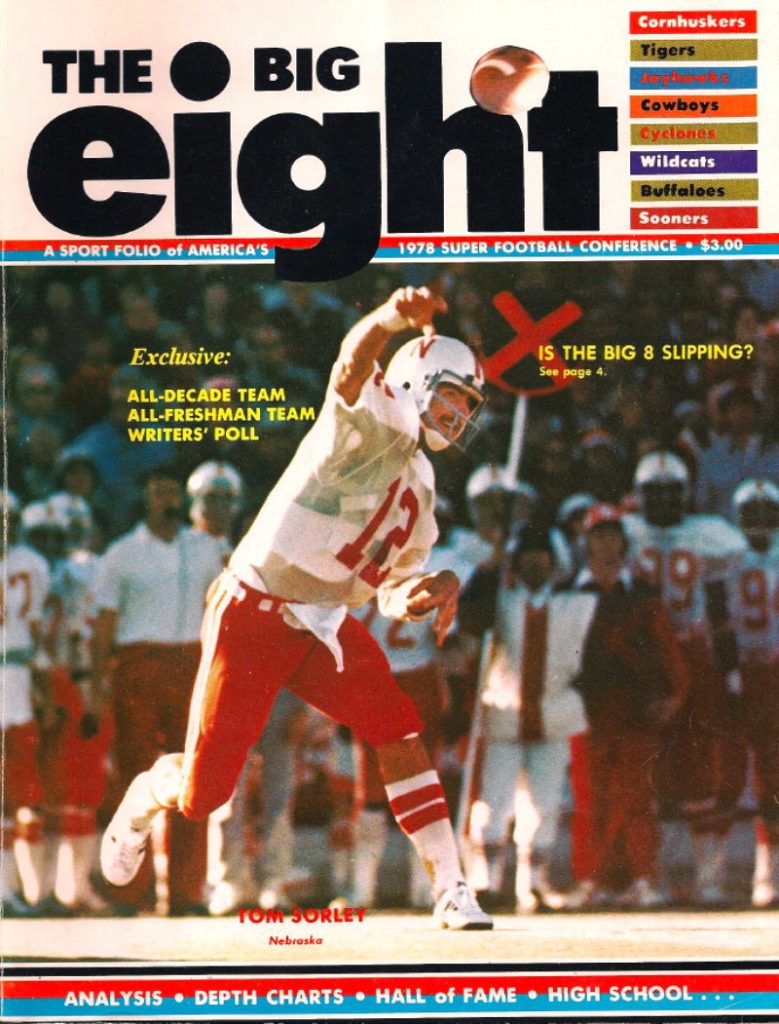
When I became a Christian in the mid-70’s something happened: It put me in contact, actually, with some Nebraska football players. I went to a small Southern Baptist Church and Tom Sorley was a member there when he was in school, and Jeff Kinney was there. And of course, there were Nebraska guys all over Lincoln. We had guys at Lincoln High; Larry Frost who had been a wingback on the ‘70 or ‘71 team, he was the head coach. And there was a wide receiver or tight end who was the assistant coach then, he was 6’3 or so and had curly hair, and then Craig Bohl, in high school he was this guy who just sort of hung around the football team. And I attended meetings with these guys when I became a Christian, and it was neat to see, because I could see the human face behind the helmets and I started to get a somewhat different perspective.
Q: You went from merely idolizing the wearers of the N to actually knowing them on a more personal level…
SC: People have often said it’s a kind of religion in Nebraska, a kind of idolatry, and I think there is actually some truth to that. But when I became a Christian -it’s an interesting story, because it kind of illustrates the struggle more than one Christian has had- and Tom Osborne talks about this: it’s just a game. It’s an important game, it’s an important part of being a Nebraskan, but it’s just a game. Obviously, it’s a huge business. It’s a lot of things.
I was on a church basketball team with Jeff Kinney and somebody ticked him off, and Jeff literally single-handedly destroyed these guys. And I really struggled with how to think about that. And I actually had to apologize to him for putting him up on a pedestal and making him more than a human being. I’d turned him into kind of a god. But when we were kids they were gods, they were like gladiators, they represented this state.
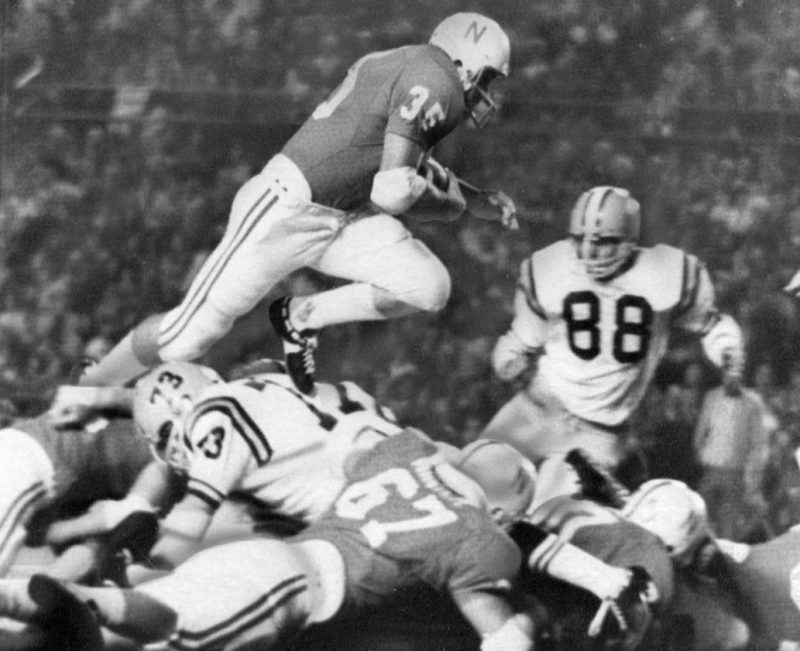
And we really hated Oklahoma. Honestly, if Barry Switzer would have walked into our school we would have attacked him. (laughs) I don’t know, maybe I’m wrong, but I’m pretty sure other people thought the same way. It wasn’t like just a rivalry, it was a deep-seated hatred. I remember crossing over into Oklahoma -my grandparents lived in extreme southwest Kansas and I remember going with my Grandma and Great Uncle to visit some Great Aunt in Oklahoma- and I remember very clearly when we crossed the state line from Kansas to Oklahoma, I kind of thought to myself, ‘This is bad. I’m in enemy territory.’ It was like I felt like a spy or soldier who was behind the lines, ‘Something really bad could happen to me. Who knows what some crazy Oklahomans might do if they ever found out I’m from Nebraska.’ (laughs) I just kind of sat in this lady’s house and just hoped that she didn’t ask me about being from Nebraska.
Q: You felt like one of the spies Moses sent out to case the Promised Land… (laughing)
SC: When I got older I got a little more perspective. And when I got older I got to know Jeff Kinney a little bit, and that he was a human being and that he had knee surgery and he was a Christian, and how to pull all that together: Christianity and athletics, especially at that level, that kind of intensity. I hung out a little while in the Fellowship of Christian Athletes and I got to know those guys and saw Tommy Sorley after a game and how beat up he was. I remember him being pretty bruised and kind of battered looking. They were running the option and he’s from Texas and was a tough kid, but he used to get the snot beat out of him. You remember how it was with the option: you had to take somebody out or take that hit as a quarterback.
Q: Because you often had to wait until the last possible millisecond to pitch it and then you’d take one right in the grill, right?
SC: Exactly. Wait for that D-end to commit or whoever, that corner to commit. And poor Tommy, he used to get the snot beat out of him. So, as I matured I began to see that these guys weren’t gods, that they were human beings.
I was a gym rat, I hung out at Creighton. I was a ball boy and just did whatever they needed. They gave me a press pass for the games and when I wasn’t playing basketball I was hanging out at Creighton in the gym or up on the hill or shooting baskets. And after I became a Christian I started to realize a transcendent truth and realities that were more important than basketball and football, but it took awhile to find a way to think about it. I remember a real unpleasant, not very winsome sermon by a reformed minister, and he really laid into us about making Nebraska football into an idol.
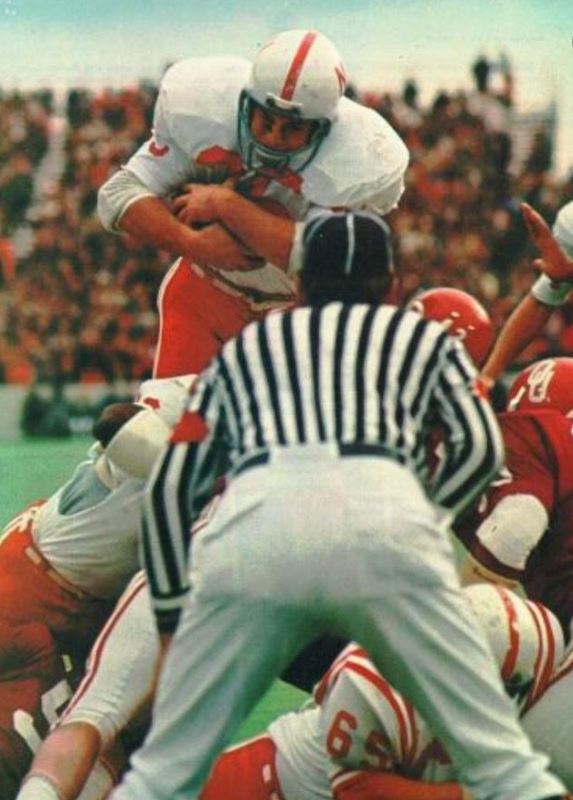
Q: Interesting. So what year did you leave Lincoln?
SC: I graduated from the University in ‘84 and came out here to go to Westminster Seminary-California and then to Oxford. And that’s when my mother-in-law started to tape games. I’ve missed very few of them. We lived in the United Kingdom from ‘93 to ‘95, and for the first championship game I did hear it live on the Armed Forces Network on the AM or shortwave band of the radio. And I remember staying up pretty much all night and we were behind and time was running out -and the sun started to come up and I’d been studying all day and was pretty exhausted- and as the sun came up I began to lose the signal, so I was pretty disgusted. And I lost the signal and couldn’t hear it anymore! So I went to bed just disgusted.
I went to bed around six a.m. and then Barbara woke me up around 10 a.m. and I thought, ‘Why on earth are you waking me up?’ But she wanted me to come out of the bedroom, and she’d made this banner -her and the girls, who were pretty small- but they’d made this banner and put it up on the living room wall. And it said, “Nebraska: National Champions!” We had come back and won the game! And, of course, I had missed the ending because of the sun and Armed Forces radio and all that!
And one of my great concerns about going overseas was that I wouldn’t hear the games, and this was in ‘94 before games were on the web. Listening to it on audio on the web in ‘94 was pretty much unheard of.
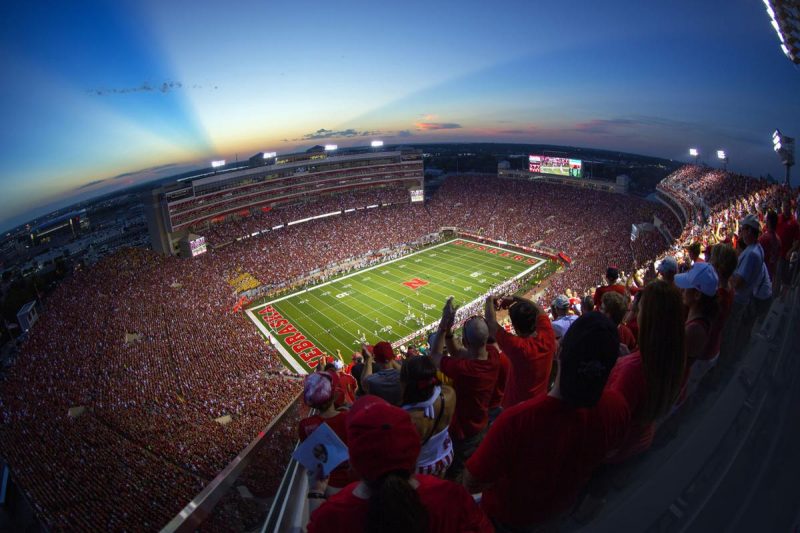
Q: I have to ask you, Scott -being a reformed Christian pastor, historian and theologian- about the first Mosaic commandment concerning idolatry and placing our affections in something else, ahead of God. If you were sermonizing, how would you approach your following of Husker Football?
SC: Well, I do think it’s been an issue. It’s been an issue my whole life. One of my colleagues, Danny Hyde, once gave me a picture of Memorial Stadium, and he had written underneath in Hebrew as a joke, “The Temple of the Lord.” (laughs) He was basically making fun of my devotion to Nebraska football.
And my kids have said that to me before, too, that it’s an idol. Question 95 of the Heidelberg Catechism explains the first commandment, and it says, “What is idolatry?” and the answer is, “Idolatry is to conceive or have something else in which to place our trust instead of or beside the one true God who has revealed himself in His word.” And honestly, that probably, certainly describes me at some point in my life. We’re all idolaters by nature.
Q: Was it John Calvin who said, “Our hearts are idol factories”?
SC: That’s right. We are. By nature we’re bent to that. It’s not uncommon at all in Nebraska and elsewhere for people to have whole rooms set aside, as you know, devoted to Nebraska football. Practically, you have a shrine with a TV and stuff around it, stuff on the walls. I’ve seen some of these rooms, and you know how people -when they get divorced- the first question isn’t, “Who gets the kids?” It’s, “Who gets the season tickets?” I guess it is an issue. Idolatry is obviously placing anything ahead of God, and it’s such an important part of our identity as Nebraskans. As a lot of people have observed, it’s the only thing people outside of Nebraska know about us.
Q: What have non-Nebraskans shared with you?
SC: They know three things: 1) they know we have bad weather, 2) they know we have Interstate 80 (and always complain about it as if we built it. As if each Nebraskan is personally responsible for building Interstate 80. It’s like they expect me to apologize. ’I didn’t build it!’) It’s in a river valley, you know? Every five miles it has to be a mile straight so they can land jets. It’s not my fault, blame it on Eisenhower. Every five miles it has to be a mile straight so they can land planes…
Q: Really?
SC: Oh yeah, it was originally part of the military system and was to be used for transport. The fact that we get to use it for driving is an added benefit. They were all built during the Cold War, eventually, to enable us to transport missiles quickly in the event of war with Russia. That’s what that was about. But we all get blamed for that, like we’re responsible- and 3) the third thing they know about is Nebraska football, because they see it on TV. If they’re really perceptive they might have known Henry Fonda, Dick Cavett, Johnny Carson, Marlon Brando, that they’re all from Nebraska…and Warren Buffett, the Oracle of Omaha, and Mutual of Omaha. But that’s about it.
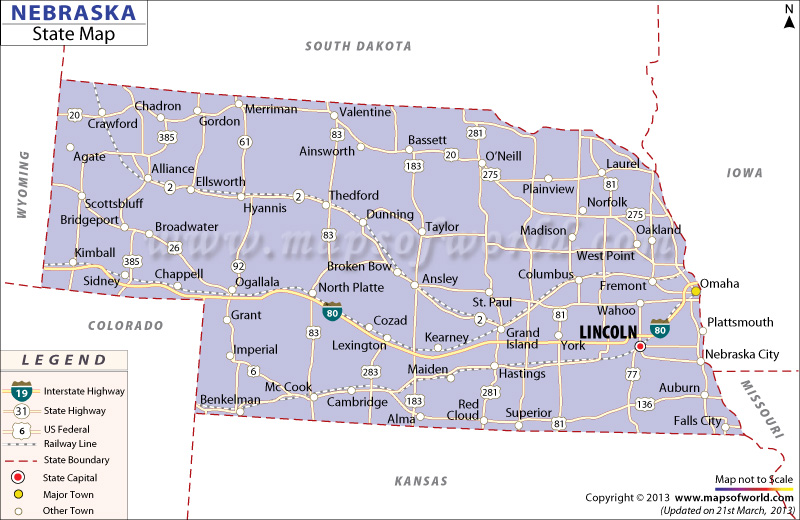
But because it’s so much a part of our identity and relayed to the world in so many ways our identity, our self-image, gets tied up with it. So when the team does badly, we feel badly. I remember as a kid, you never wanted to be in downtown Lincoln or any place when we lost. I just remember some of the darkest, most dismal times of my life were after a loss and seeing ‘O’ Street completely vacant, nobody there. And if you saw somebody driving down ‘O’ Street after a loss, particularly a late loss to Oklahoma, you knew that person had to be from out of town. You’d look at the plates and sure enough they were out-of-towners. If you’d lose, you pretty much went inside your house and you sulked, drank beer, and you’d get really angry.
Q: Hence the hate for Barry Switzer…
SC: It was passionate. I remember talking about it amongst ourselves in school, how much we hated Barry Switzer, what we would do to him if we ever had the chance. The passion -you’ve been there, you know what it was like- the pain. Even to this day. I like to think I’ve put it in some perspective, but I don’t think I really began to put it in perspective until we got killed by Colorado in 2001. All I have to say anymore is ‘The Colorado Game.’ Everybody knows what I mean. I realized in that game Nebraska Football was too important to me. I always denied that it was an idol, but at that moment I realized I had invested way too much of myself in Nebraska football.
I mean, it was crazy what a bunch of teenagers and twenty year olds did on a football field… how could that affect me so much? I can still see them running these short routes and these delays and just killing our linebackers, and screaming at the television, ‘What’s wrong with you guys?! Why can’t you stop these delays and stuff?!’ From that point forward my wife and kids won’t be in the same room with me when I watch a game, because it’s too intense. Honestly, I don’t even really like to watch a game with other people. I can do it when necessary- and my family might contradict this- but I think I’ve learned to control myself. I’ve gone to some sports bars with friends and gone to a friend’s house to watch the game, but I really prefer to watch the game by myself in a room with a good TV. (laughs)
I’ve gone to people’s houses -and we didn’t have cable when I first came out here because we couldn’t afford it- and I’ve had to go see a game at a colleague’s house, and they were eating dinner. I said, ‘Don’t mind me, just keep eating your dinner,’ and I just pulled up a chair in front of the TV. And it’s weird, because it’s an intensely private moment in someone else’s house. It was hard to explain. And I did that at a friend’s house here in Escondido and they still talk about it! (laughs) They’d never seen anything like it. Even though I’d like to think I’ve gotten it in some perspective, it’s still a very intense experience. I probably have more emotional ups and downs in a football game that I do in a church service. (laughs) I do think that people have to be conscious of the fact that anything can be an idol, and certainly something as powerful and pervasive, as influential and important to Nebraskans as Nebraska Football, it certainly can be an idol. At the end of the day, football isn’t going to save you, it isn’t going to…
Q: Wipe away your sin, your guilt, your accusing conscience?
SC: Exactly. It’s not going to do any of those things. It’s really entertainment is what it is. It’s competition. It’s camaraderie. It’s community. I think one of the good things about it, it draws together a whole state. And I’m not the first person to notice this, and I’ve seen lots of different parts of Nebraska: Western Nebraska and the sandhills, Southeast Nebraska and Central Nebraska, but also the urban, the very most urban part of Nebraska, like North Omaha, 24th & Lake.
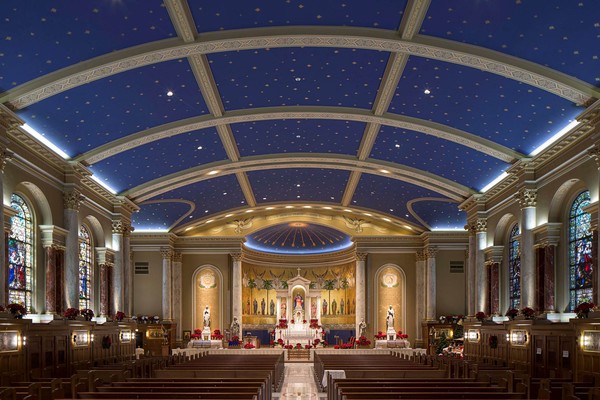
I used to play basketball down at the Kellum Basketball Center in the community center, basically an all-black basketball league. There were basically like three of us on the team -we were the only mixed-race team- it was pretty bombed-out. But the one thing that unites us, people from Big Springs to people from 24th & Lake in Omaha, it’s Nebraska football. I mean, that’s the one thing that we all share. Even though a kid from Big Springs has almost nothing in common with a kid who’s going to Tech High -which doesn’t even exist anymore, or Benson- where those are pretty much urban places with urban problems and urban culture. Big Springs doesn’t have an urban culture, but we all have Nebraska football.
If you listened to a call-in radio show you’d hear people who clearly have rural backgrounds and people who have purely urban backgrounds. It’s the one thing that rich people and poor people have in common. And there’s a lot of poverty in Nebraska. Nebraska has one of the most impoverished counties in the United States, but there is also a lot of wealth, obviously with Warren Buffet and others…
Q: Warren skews the averages a bit…
SC: But there’s a lot of old-money families in Omaha and Lincoln and elsewhere, and big ranches -the amount of ranching wealth way out west- so you have really extreme poverty that people don’t realize and pretty extraordinary wealth, and you can put those people at the same table and the one thing they can talk about is Nebraska football. That creates a kind of community. When you’re at Memorial Stadium and you’ve got your scarlet and cream on, you’re just a Nebraskan. You’re not this kind of Nebraskan or that kind of Nebraskan, you’re a Nebraskan. That’s a powerful thing. There’s not anything else in the state that does that.
Q: It wipes away social pretense…
SC: It breaks down social barriers. I could not talk intelligently with Warren Buffet about stocks. I’ve read his biography and that’s about pretty much all I know about stocks from reading it, but I can talk with some degree of intelligence about Nebraska football. And it also bonds people together all over the country and even all over the world. I’ve been in watch parties out here in California and it’s interesting. You sit down at the table with people you’ve never met to watch a game, and they’re from Omaha or from Tecumseh or Grand Island, and we’re all expatriate Nebraskans. Even though people have been gone 40 or 50 years they still say, “I’m a Nebraskan,” which is interesting.
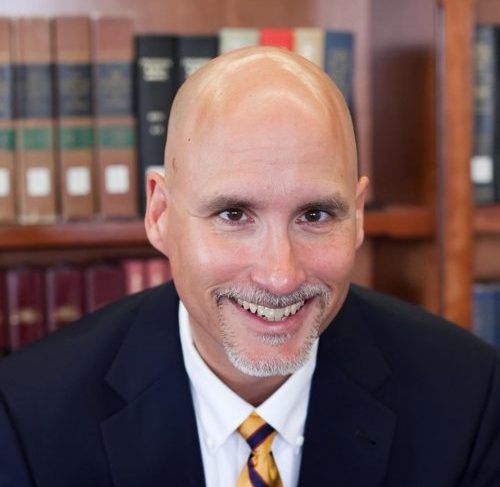
Q: In your mind, when you say, “I’m a Nebraskan,” what does that stand for? What does that mean? What is inferred?
SC: That’s a good question. As I get older I think more about that, because I ask myself, ‘Why do I do what I do?’ And I realize I think the way I go about things -when I moved out here the first time in ‘84 I remember it was November and it was a beautiful, warm day and I remember looking out a window over a hill. And I remember looking at a calendar and thinking, ‘It’ll be snowing soon.’ And then I realized, ‘I’ll bet it doesn’t do that here.’ (laughs) And I felt guilty for a long time, because as it got colder back home (and I still refer to Nebraska as ‘back home’, which is strange, because I’ve been gone a long time), and I remember feeling guilty that it was so nice here in Southern California and I knew exactly what it was like back home. I remember in 1978 we had thirty straight days of sub-zero temperatures and I had to catch the bus. And that’s all a great part of who I am. So all of those things were formative, and then the fact that I felt guilty for having nice weather.
I think part of being a Nebraskan -and this sounds a little crazy- when I look at Tom Osborne I think I know him, I understand him, I know why he does what he does. I know why he did what he did with Lawrence Phillips. That makes perfect sense to me. There’s a kind of egalitarianism, but also a kind of stoicism. You could just see Tom Osborne setting has face like flint and, “This is the way it’s gonna be. We’re gonna go for two. We don’t mess around.” I remember Nebraska teams didn’t get a lot of cheap penalties like personal fouls because Osborne didn’t tolerate it, you know? If you did that stuff you got pulled. That’s Nebraska. This sort of sense of fair-play, but also an expectation that things are going to be hard: it’s windy, it’s unbearably hot or freezing, it’s hard.
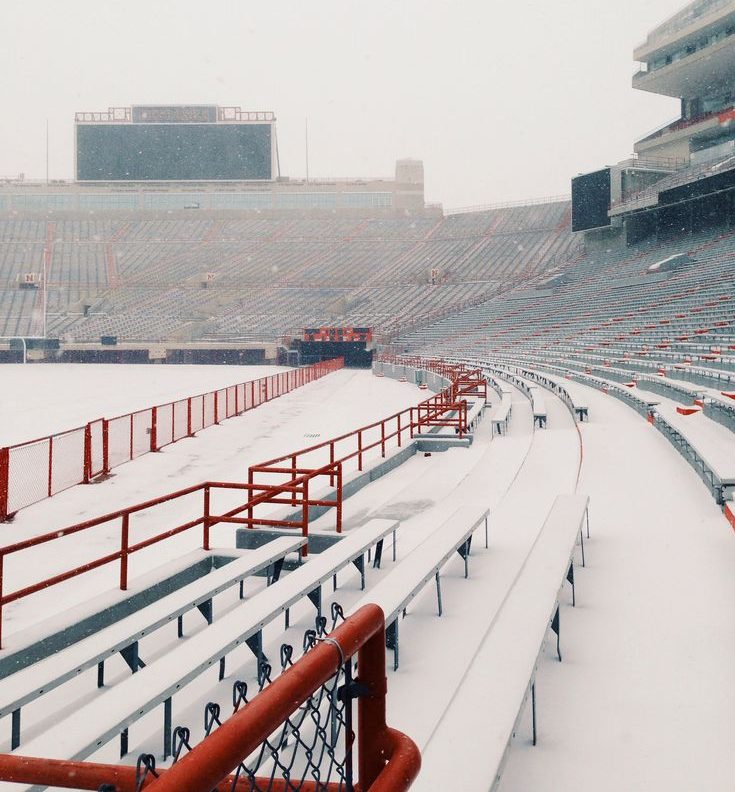
In Phil Jackson’s first biography he wrote in the 70’s after he quit the NBA, in the opening pages he said the strongest memory of his youth was the wind: “The wind never stopped.” And the moment I read that my first thought was, ‘Don’t be stupid. Of course it’s windy.’ And then later I realized, ‘No, it’s not windy like that everywhere. It’s windy like that in the Great Plains.’ If we get a thirty mile an hour wind out here in California everything comes to a halt. But a thirty mile an hour wind back home? It’s a daily occurrence. As a kid I remember riding my bike and leaning into the wind without my hands on the handlebars, and the wind was holding me up! (laughs) I remember hating the wind, because it was like an opponent, it was like weight resistance. I didn’t have to lift weights because I rode a bicycle uphill and into the wind. To this day I can get on a bicycle and pretty much go as long and as far as I want.
Q: That reminds me of one of the first times my folks came to visit San Diego. After a whole day of seeing this beautiful city, do you know what my Mom had to say? “Where are all the bugs?” (laughs) There were none plastered on my car’s windshield! She wasn’t accustomed to seeing the world through a clean, clear windshield come sundown. (laughs)
SC: That’s right! That’s the thing. I always know when I’m east of the Rockies because of the bugs. When I’m west of the Rockies there are no bugs! (laughs) I saw in that six-hour documentary that we were called Bugeaters not for fun, even though it was meant lightheartedly, but some people really did eat bugs to survive those tough pioneer years.
Q: Though it was probably slightly derogatory, too…
SC: Or a statement of fact. Obviously, everybody in Nebraska has swallowed a bug at some point. But people would actually eat bugs during the Great Depression and Dust Bowl because they were so impoverished.
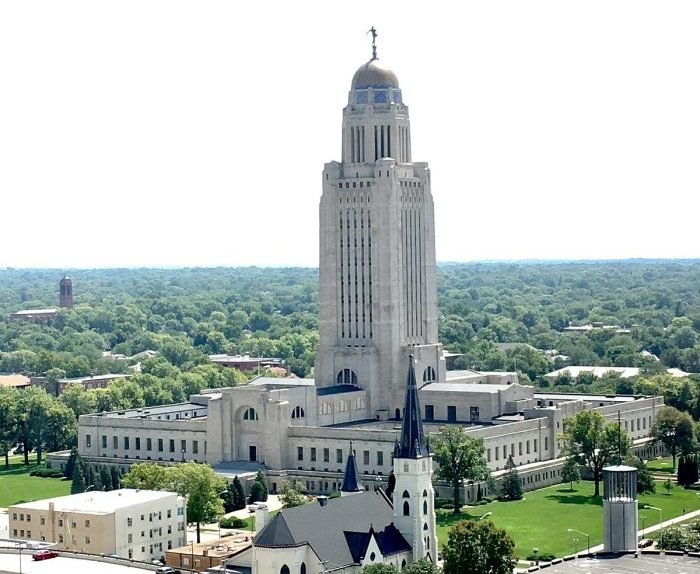
Q: I once read that the average American eats five pounds of dirt a year. With all the wind-blown topsoil and what not, imagine how the typical Nebraskan’s intake skews that number? (laughs)
SC: You know, one of the things I actually appreciated about Lincoln relative to Omaha was that the wind was dryer. It didn’t seem to be quite so humid in Lincoln as it was in Omaha. And the weather didn’t seem to be quite as extreme, but maybe that was a function of time. And Lincoln seems to get tornadoes, but they never seem to touch down. But Omaha always seems to have them touch down, and I was in the big one in ’75. If you just say, ‘The 75 Tornado’ everybody who’s from there knows what that means. It’s like the Grand Island Tornado, which I think was even bigger that next year. I guess one of the things I’ve said to people is that being a Nebraskan means that for parts of the year the weather isn’t just hard, it wanted to kill you. I remember thinking of the weather as a kind of thing, an entity, a person almost. Like an opponent. It’s not benign: it’s 97% humidity or it’s 105 degrees or it’s twenty below, or forty mile an hour winds, tornadoes or blizzards. It really wanted to kill you, and it will kill you if you let it.
Q: When I tell someone I’m a Nebraskan, I think the weather and our ability to withstand it for a length of time plays a huge factor in our makeup, because not a lot of folks can take it, can withstand it. It’s both your friend and your enemy, like you said. Heck, almost seventy-five percent of the state’s early settlers couldn’t cut it and headed back east again! I can only imagine what it was like in my part of Nebraska where I grew up, on the edge of the sandhills.
SC: I was going to say, your being right on the edge of the sandhills, I drove Highway 2 out to the sandhills a few years ago. And that was a great drive, by the way. That was one of the greatest drives. It was gorgeous! I was amazed at how beautiful the state was just north going from Grand Island. You get on Highway 2 and start going west, and what a gorgeous place.
Q: Whenever someone complains to me about I-80 I always tell them, ‘All you have to do is get off and find a parallel highway, then you’ll get a true sense of the beauty of Nebraska.’
SC: Exactly! What is it on the south, Highway 34? There’s a parallel to I-80 and I can’t remember its name, but it’s a beautiful drive. It’s gorgeous! But I think being a Nebraskan isn’t about the weather, it’s about a kind of attitude, a sort of expectation that life is going to be a challenge and you had better…(pause)
Q: Prepare to ‘engage’ it?
SC: Yeah, prepare to engage it. There’s a kind of openness, a kind of willingness, I think, to help in a way. I don’t want to paint too rosy a picture, but places like Nebraska are a little different than other parts of the country. There’s a lot of small towns and a lot of people are still from small towns. And I think that makes a difference, it has an upside and a downside.
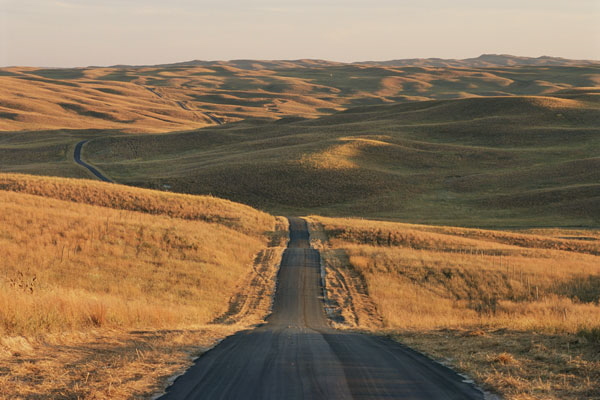
Q: Folks are more willing to push you out of a snowbank rather than merely drive on by?
SC: I don’t mean to suggest that Nebraskans are any less depraved than anyone else; I think that depravity probably manifests itself in different ways. I think a lot of it is the fact that a lot of Nebraska is rural. Geographically, the elite of it is urban, even though a vast majority of people live on the east end of the state. If you put it on an axis the whole state would tip over right into the Missouri River because that’s where a lot of people are. But a lot of people in those areas have rural roots and a rural background. And one thing I’ve noticed when I’m in Lincoln is that a lot of people don’t use their turn signals, and I’m convinced it’s because they’re from a small town. Nobody uses a turn signal in a small town because it’s redundant, because everybody knows what you’re gonna do anyway. (laughing)
Q: That’s so funny you would say that, Scott, because I have to confess that when I first moved to Lincoln for college I had the hardest time forcing myself to look up at the traffic lights, because I just wasn’t used to ever driving and looking up that high in the air while driving. It was always the ground-level stop signs and yield signs and slow moving tractors and wild animals you had to look out for, you know? Not the streetlights.
SC: (laughs) Exactly. You’re not alone, I’m sure lots and lots of people had to do that. And it wasn’t that long ago that Lincoln was an oversized small town. When I moved to Lincoln in 1975 I felt my parents had taken us to the end of the world and dropped us off. It was probably 125,000 people, but Omaha was maybe 350,000. I remember going downtown after we moved there. I just rode my bike downtown and it wasn’t that far away, and I went to Kep Hardings Sporting Goods at 5:15, 5:30 p.m. And it was closed! And I could not get over the fact the whole downtown was closed at 5:30 in the afternoon. I went back home and I said, ‘Where have you taken us?! This is crazy!’ (laughs) Lincoln struck me as this backwater burg. I came to love it and see that it’s a great town, but it took me a while to appreciate what Lincoln had to offer.
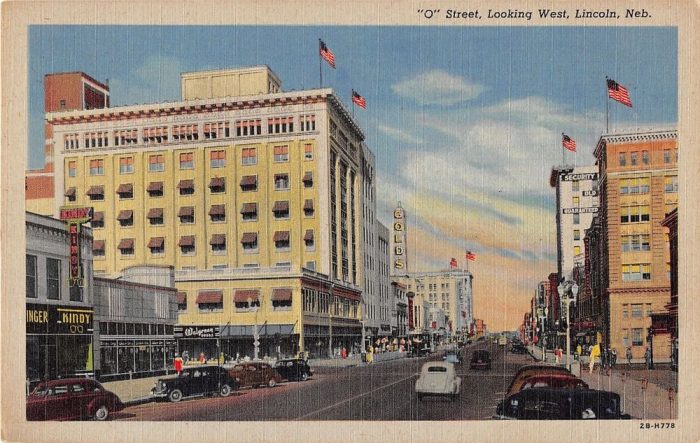
Q: I agree. Now, we’ve previously touched on idolatry and some of the negative aspects of Nebraska football fan-dom, but can you touch on any positive aspects? Can you find many parallels between Nebraska football and Christian doctrine, per se?
SC: Boy, that’s tough. ..
Q: Let me load it up for you, okay? To distill the essence of basic Christian doctrine it seems we’ve got the three G’s: Guilt, Grace and Gratitude, right? And I’m not sure of the fancy term you use to describe that: the Chain of Salvation, maybe? And correct me if I’m wrong, but first you’ve got guilt, which is the conscious realization, an awareness that you have fallen short of a standard, which in this case would be God’s holy law, the Ten Commandments, right? This guilt-awareness produces a downtrodden demeanor, the ‘poor in spirit’ as Christ describes in his Olivet Discourse, right? Then you’ve got Grace, where the capacity for faith is actually gifted to you. And we all know faith can be in an object, an idea, or a person, which in this case is Christ and the Holy God-head, right? And finally we have Gratitude, where you finally put that saving faith and attitude of gratitude to work in your daily living as a result of being saved from your previous, pathetic, sin-filled situation. Are you with me yet?
SC: Sure…

Q: Well, I‘ve found in talking to a lot of these players, Scott, is that they actually experienced something much like this chain of events as they joined the team and made their way up through the program’s ranks and matured. First they realized that their young, smaller, less mature bodies weren’t ready for the rigors of Nebraska Football, Division 1 football, with these behemoths flying around the field. And because of this realization the first day or so on campus they were often brought low, which made them question their fitness for the task.
But then they had a year in the weightroom and the training table and survived all those beatings on the scout team they would take every day and realized that they had what it takes because they didn’t give up, which could be considered a faith in their future, in the promise of what they could be if they persevered, if they simply followed the proven path. And as a result of this hopeful awareness they then possessed a level of joy and would feel this sense of grace through becoming a contributing part of the family, the team, with Coach Osborne and the assistants and their fellow teammates.
Finally they had achieved a status of knowing the system, trusting the system, and being physically able to climb the depth chart and hang in there with the best of them. It was a manifestation of having been lifted from their lowly state with the reward of that crucible experience coming about in the beating of each week’s opponent on Saturday. So many of them tell me that the last thing they ever wanted to do was let Tom Osborne or Charlie McBride down, which to me sounds like an immense sign of love, respect, and gratitude. To me, it sounds like the same emotional, and dare I say it, spiritual rollercoaster. I’ve noticed so many parallels. My metaphor might be reaching and convoluted, but what would you say of this?
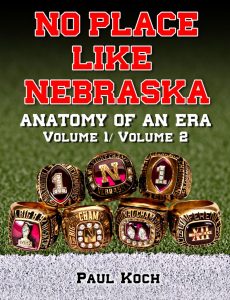
SC: As you go through these I can kind of see where you’re going, and I have to think about that. (pause) I understand what you’re saying and I agree with you, and there are probably a number of ways that football is unlike salvation, because, for example, on principle: Redemption is revealed in scripture and not revealed in nature. What’s revealed in nature is the law and not grace. Grace is revealed in scripture. If we say that we can find analogies in football are we saying we can find the gospel in nature? In principle I want to say, ‘No, you can’t do that.’
But I do think, at the same time, some of the analogies you’re finding are interesting. I’d guess I would rather think of them less in terms of redemption and more in terms of virtue, because Christians do believe in virtue as a consequence of grace and salvation, that the Spirit does work virtues in us. And we also believe that we live in two kingdoms at the same time, and the civil kingdom is a covenant of works.
And one thing I’m guessing that young football players have to learn is: you may have been a big deal when you were in high school and kind of float through things, but it’s the big-time now, and you have to, like you say, hit the weightroom for a couple of years and play on the scout team and pay your dues, take your licks, be the tackling dummy. That’s all kind of a covenant of works, and that’s the law.
Basically, in broad terms, everything we do outside of the church is essentially about law, in a sense. Schoolwork is about law, civil life is about law, your job is about law. Basically it’s “Do this and live.” Now, there is Mercy, but Grace really is a very high concept and we want to reserve it to the unmerited favor of God for sinners.
Q: So don’t make it too anthropomorphic, eh?
SC: Yeah, I think not. I think there are ways to talk about it that might make it sound a little corny, but sports and competition does build some character, does teach you things. And one of the things you learn in sports is perseverance. And I hate to put it this way, but today’s generation has everything instant: instant food, instant entertainment. And I don’t think they understand that you’re not going to become a good student or a good football player overnight. You have to suffer, you have to pay and sacrifice.
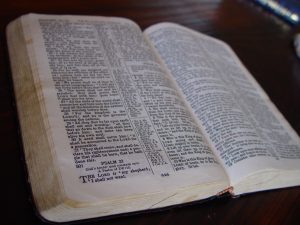
Q: You have to do that to be a good ‘anything’…
SC: Exactly. I think there is a way in which competition really does shape values, which may be a broad term, but it does testify to a necessity for certain types of virtues, like perseverance. Maybe that’s the first thing that kids learn, “Hey, you might have a bad game or three bad games, or you might have to sit the bench for a year, or you might have to redshirt or put on a few pounds or those type of things.” At the end of it all (and I’ve been a fan for almost forty years now -you hear these players say at the end of their career, a lot of the guys, even the ones who don’t play very much), they say they learned a lot about sacrifice, cooperation, perseverance, determination, courage, those types of things. Those are valuable virtues that ought to be formed in people. They’re not saving virtues, but it’s a good question. I guess I’d have to think about it. What can you say about faith relative to football? Because that’s the question.
Q: But what would you say about faith relative to football? The Apostle Paul does use athletic metaphors…
SC: Punishing his body? Yeah, there are analogies. I think we can talk about analogies between athletics and the Christian life. You can certainly do that. And in some ways I think Tom’s been helpful in some of the books he’s written, “More than Winning,” where he’s touched on some of those themes. They have to be handled carefully so we don’t get the impression that, having said that -that Nebraska Football isn’t a religion- that we turn around and say that it’s a metaphor for Christianity. I think that can be confusing to some.
Q: I am most likely one of those people! (laughs) You’re probably three or four levels over my head when it comes to this sort of stuff, Scott. I used the term anthropomorphic a little earlier because it’s so easy in today’s culture -as a result of the Enlightenment- for man to bring God down to himself and even, perhaps, view God as not only even to, but to a position of being lower than mankind…
SC: I agree. It’s been a problem for a long time. The Enlightenment was devastating because, like you say, it really did attempt to put man on a par with God, or worse. But we’ve been doing it a long time, because that’s essentially what Adam did. But your point is right.
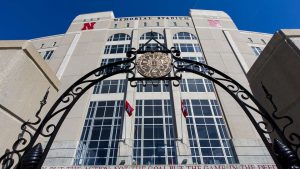
Q: Here’s a question: from your perspective, what is the definition of a cult? Could Nebraska football and the devotion for it be termed a cult? Or is that an improper use of the word?
SC: That’s an interesting question. I’m not a sociologist, but the word ‘cult’ in that context is a word that sociologists used to use. They don’t like to use it anymore because it tends to stigmatize minority religions, and I think it also makes it difficult to communicate with people who are in them. But at the same time, historically, Protestants have referred to deviant religious groups as a sect. That term also gets used in a more broad, generic sense to refer to different denominations. It has both pejorative usage and non-pejorative usage, I guess.
But Nebraska Football… the technical meaning, etymologically, the root of the word ‘cult’ is simply Latin for ‘worship’, and that gets us back to the first commandment. So you say, “Could it be a religion?” People have said that for a long time about Nebraska football, that it looks like a religion. So, like I say, people have their shrines in their houses…
Q: Their places of worship, their priests, their saints…
SC: Yeah, I think it could easily be that and almost certainly is that way for some people. One of the things I think that minister should have said back in ‘80 or ‘81 in that sermon about football is that, “We have a lot of idols.” A well-trimmed lawn can be an idol. Now, there’s nothing wrong with trimming your lawn. There’s a lot of pressure to sort of fit into suburban, middle-class American culture and want everyone to think a certain way about you, so really the image you project can become an idol. Your job can be an idol, your family can be an idol. Success can be an idol. And I think (the minister) should have made the point that there are lots of idols in this world. To focus on the big, obvious one, it would have been fine to discuss it, but to rail against it for a good half hour?
The solution, the answer to idolatry is repentance and faith in the God who is revealed in Jesus Christ. So what idolatrous Nebraskans need to do is recognize -and I would think Tom Osborne would agree with this- that Tom Osborne was not crucified for us, Bob Devaney was not crucified for us…
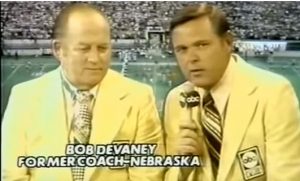
Q: Some people might have liked to do so after a few particular games…(laughs)
SC: Yeah. (laughs) Exactly. These are important figures, but they’re just men and they’re not saviors. They’re not the God-man, not the incarnate Son of God.
And you would know that better than I because you’ve been on the inside. But I think you have the sense that even people who are in the program sometimes feel a little uncomfortable with the way that people look at them, not just the publicity and the fame, but the adulation and the craziness, right? (laughs) Don’t they feel a little uncomfortable with the way people look at them?
Q: Some folks come up to former assistant coaches on airplanes to this day and, “They say real nice things. But to be honest, it’s a little bit embarrassing.” But then again, it could be an outgrowth of the gratitude for the victories and everything they’ve meant for Nebraskans, you know?
SC: See, that’s it. I think that’s it. I think it’s very mixed. I don’t think you can really say whether it’s black or white, one or the other. I think the gratitude is genuine and heartfelt.
I think a lot of Nebraskans really do appreciate the hard work -and this gets back to the themes that show up in Mike Babcock histories and all of the histories behind Nebraska Football. And one of the things I’ve always heard about Nebraska football was that we worked harder than anybody else. That’s a thing, that’s a theme with which Nebraskans identify. They understand hard work. Just in my own life: I started working when I was fourteen and it didn’t seem odd to me at all. I mean, I started washing dishes at 4 in the afternoon and didn’t get off until one in the morning. Now, maybe it’s not healthy, but I really don’t know what to do when I’m not working.
Q: Funny you say that, because to me that’s another main tenet of being a Nebraskan. It’s like how we live out our Reformed vocations: we’re hard workers, we don’t cheat our bosses, we put in a full day’s work for a full day’s pay, we give everything we have to the glory of God, hopefully…
SC: I think in some ways it’s problematic, but this virtue: good old-fashioned hard work- and my folks are originally from Kansas- but they didn’t think anything of sentencing me to a day of snow-shoveling or mowing the lawn. Not for an hour, but a day. They didn’t feel the least bit guilty, because they had both worked very hard and did work hard. It’s not just Nebraska, it’s the whole upper and lower Midwest, that whole Great Plains region from Canada all the way down to Texas, everybody knows about hard work. If it’s ranching or farming or whatever you’re doing, even shoveling snow, it has to be done.
One more story, and I know you know this and I’m not sure what it was like in your town, but in Omaha and Lincoln just as soon as I’d get the driveway shoveled some guy with a snowplow would come by and just plow-in my driveway. (laughing) I’ve never forgiven those guys!
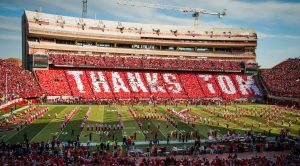
Q: I was that kid, too, and know what you’re talking about. It’s like he was hiding around the corner with that Department of Roads Caterpillar just waiting for you to finish before hitting the gas and messing up all your hard work! (laughs)
SC: Yes! I just wanted to climb up there and say, ‘What is wrong with you? What are you doing? I just cleared this driveway. Have you lost your mind? Do you know how long I’ve been out here?!’ (laughing) And I tell you, my back is aching because I can just feel the memory of shoveling snow from seven o’clock in the morning to four o’clock in the afternoon.
Q: And you know what’s funny, Scott? Husker Nutritionist Dave Ellis shared a picture of the University of Oklahoma’s weightroom, and up on the wall in giant letters it says, “Hard work beats talent when talent doesn’t work hard.”
SC: Oh, amen. Look at the classic Nebraska story: Walk-on, scout team, kid from small town Nebraska busts his tail and makes it. That’s Nebraska. That’s Nebraska. That why people love that team, because it’s a metaphor for his whole existence. If I work hard and do my job, I can do something useful or good or beneficial, whatever.
Q: Bless my fellow man and simultaneously give the Lord glory?
SC: I would think there are some Nebraskans who think that. I don’t want to impute too much to one and a half million Nebraskans. (laughs)
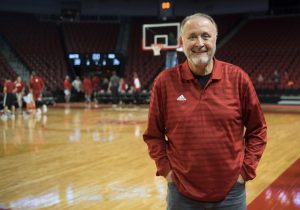
And one thing, I remember being in the UK and listening to Kent Pavelka doing those games, and one thing he said was that Nebraska football brings everyone together, and that’s so true. His voice is such a big part of it, like Lyell Bremser. I grew up with Kent Pavelka and Jack Payne, Gary Saddlemeyer. Obviously you’re old enough to remember Lyell Bremser?
Q: Oh, yeah. And I remember the first Husker player I ever heard about. My older brother, Doug, he used to rave about Rich Glover. And I remember as a kid thinking how odd it must have been to be a football player with the name ‘Glover’, because I figured having a name with the word ‘glove’ in it, the guy should have been a baseball player, right? (laughs)
SC: Sure, sure. (laughs)

Q: Well, it’s been a rich conversation gnawing around the edges of Nebraska-isms and your take on the Church of the Corn as it concerns and often comes alongside Christianity. And it’s kind of funny how years ago I moved from the Corn Belt to the Porn Belt, and who would have believed this is where I truly found my faith in Christ?
SC: (laughs) That’s funny! I’ve never heard that before. Corn Belt to the Porn Belt. Incredible…
Q: And I should add that sharing a few lunches with Coaches Ron Brown and Turner Gill at the training table was a nice introduction to a masculine form of Christianity and evangelicalism. They have no idea what effect their small talk and shared lunch table had on me. I owe them a debt of gratitude.
SC: Wow, so how did you come to faith, then?
Q: Well, I decided to read the whole Holy Bible from front to back. It was 1999 and I got myself a bible that takes a guy through the whole thing in a year. So every day, very disciplined, I read through the scripture that corresponded with that particular date. I did it religiously, no pun intended. So here it was New Years Eve -Y2K, if you remember- and I was getting out of my car in a country bar’s parking lot in San Diego when I glanced into my rear view mirror and saw the bible in the back seat. Well, I promised myself that I would read that entire thing over the course of the year and here it was, the last day of 1999. So I sat in my car outside this bar and finished the last few chapters of Revelation. And as I closed the book I came to the realization that this God is a God who makes promises, is a God who keeps promises, and there were a few promises left that were yet to be fulfilled. It put the fear of God in me, for lack of a better term. (laughs) So I developed a profound love for the scriptures after that and re-read the entire bible again the next year with ‘spiritual eyes’, so to speak. It came alive for me.
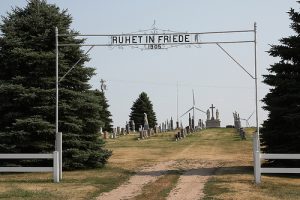
SC: Wow, I hope you include that in the book to help people understand a little more about you and where you’re coming from. It puts some flesh on you and your faith and might help people to make some connection with you in how you’ve gone about putting this book together.
Q: Well, truth be told, I like to think of myself as mimicking the Gospel account of Luke, the doctor, who hunted down various people and heard their recollections of Christ and the Apostles and then wrote it down for all to know and believe. I guess in some respects I’m a ‘Luke’ of sorts, talking to all the folks who had a part in those great years of Husker Football and putting it down on paper for all to read.
SC: Interesting analogy. That’s good. I hope I’ve been some help. (laughs) And the ‘Corn Belt to the Porn Belt’ line? That’s the best one I’ve heard in weeks.
End of conversation.
To be completely frank, I saw much of myself in Scott Clark’s discerning words and recollections above. At times I’d been so wrapped up in the contest that it skewed my judgement, finding myself screaming, cursing like a crazed madman to the shock of fellow ticketholders in the student section. Other times I’ve been able to sit back and leisurely take it all in with nary a worry in the world about the final score, as if experiencing some odd sort of out-of-body moment. It’s those times and the ones in between these extremes where I’ve developed an appreciation for all that is Nebraska Football, because the game has the capacity to simultaneously reveal to me the kind of people my forerunners were, what kind of individual I presently am, and provide a sense of excellence that you and I can both aspire to in the future. It’s told me that life is fleeting, that there are few timeouts, that the wind is often at your back and then, BAM!, in your face without a moment’s notice. I can empathize with Professor Clark, because I’ve been there. I’ve walked those high, endless Memorial Stadium end zone aisles. I’ve listened, grasping and transfixed to Bremser and Pavelka and Rose and Swain and Sharpe on that radio. I’ve sweated out some steamy, hot and sultry Saturday afternoons and then huddled, teeth chattering, in that same, frigid wooden plank of a seat only six weeks later. Heck, some games I‘ve only used the spot as a place to put my personal belongings, never actually setting my derriere there. Such is the excitement and exhilaration of Nebraska football. Former Husker Center and all-time great Dave Rimington once wrote, “Nebraska Football -You can buy a ticket for a seat, but you will only need the edge.” Amen, brother. Amen & Hallejullah!
As for that fanaticism, that religion, that fervor, that idol known as football? It’s so much a part of us that it can sorely be separated, like bone from marrow, plasma from platelets, heat from warmth, cool from the cold, body from soul. It’s all a matter of degrees, really, and quite often barely imperceptible ones at that. It’s who we are. It’s how we are. It’s, to a point, why we are. It’s the metaphor, the simile, the analogy, the antonym. It’s the struggle, the pain, the pleasure, the pageantry, the apex and the desolation, the mortification, the panic, the paralysis, the pomp. It’s who we are, and we can’t help but love to love it and hate to hate it. Like a thrice heartbroken lover, we often find ourselves crawling straight back to it on hands & knees at our near peril, drawn like a moth to the flame. So, yes, it is a sickness.
But yet, it remains our virtue. For it reminds us that we survived last season’s or last week’s folly, that we persevered at the expense of perishing hope, that we hold within us an unconditional love, a peace, a patience for the young bodies in their dance of gracefulness, synchronicity and bawdy brutality. That man can achieve, can persist, can obtain understanding and exhibit altruistic displays of generosity. That the foundational human virtues of character, obedience, honesty, hard work, orderliness, loyalty, respect, sacrifice, responsibility, unity, perseverance, and teamwork still hold sway in an ever-changing and rapidly developing world. That there still exist some bedrock virtues to hang our hats on at the end of the day.
Because for good or ill these are our boys, these Huskers. These are our brightest and best. From near or far, these are ours in good times and bad, in sickness and in health, in victory and defeat. But mostly in victory. Not the Goal but the Game, Not the Victory but the Action, In the Deed the Glory? Maybe. Maybe not. But hold on to virtue, says the learned Professor. And by all means your Savior, too. Just don’t confuse them one for another. Go Big Red or Go Big God? Can both healthily co-exist? That answer is a tough one.
Notable quote #2:
Scott Clark on being a lifelong Nebraska Football fan: “It’s an important game. It’s an important part of being a Nebraskan, but it’s just a game… Even though I’d like to think I’ve gotten it in some perspective, it’s still a very intense experience.”
Copyright @ 2013 Thermopylae Press. All Rights Reserved.
Photo Credits : Unknown Original Sources/Updates Welcomed
Author assumes no responsibility for interviewee errors or misstatements of fact.
https://www.huskermax.com/category/no-place/